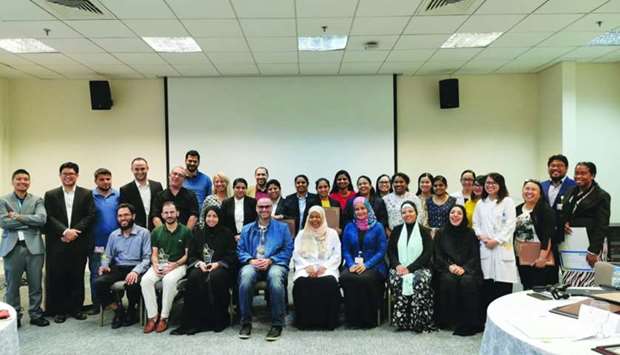Hamad Medical Corporation’s (HMC) Nursing Informatics Department provided the basis for a series of workshops developed by the College of Science and Engineering (CSE) at Hamad Bin Khalifa University (HBKU) in partnership with the country’s largest healthcare provider.
HBKU’s involvement in this initiative was also supported by significant contributions from Qatar Computing Research Institute (QCRI).
Launched in March 2019, the Nursing Informatics Research Community Programme was designed specifically to support the work of HMC’s nursing and midwifery department and its efforts to build capacities in the field of health informatics research. The programme consisted of four research seminars attended by 500 nurses, followed by two batches of workshops which attracted 55 participants. Teaching and expert insights were provided by HBKU’s Dr Samir Belhaouari, Dr Dena al-Thani, Dr Tanvir Alam and Dr Alaa Abd-Alrazaq.
The workshops primarily touched upon topics related to ethics, proposal writing, quantitative, quantitative and mixed method approaches for health informatics, research communication, and data analysis.
The recently-concluded second round of workshops was initiated by QCRI’s Dr Luis Fernandez-Luque in conjunction with HBKU’s project leader, Dr Mowafa Said Househ. Important contributions over the course of both sessions came from Dr Wasmiyah Dalhem, executive director of nursing informatics, and Noha Ahmed, nursing informatics specialist. Both were instrumental in developing the workshops and co-ordinating activities between HMC, HBKU and QCRI.
“The college’s Master of Data Analytics in Health Management and Master of Information Systems in Health Management were introduced in anticipation of the revolutionary and transformational role data will play in the healthcare sector,” said Dr Mounir Hamdi, dean of CSE.
Dr Fernandez-Luque, a social computing scientist at QCRI, said, “It was a privilege to bring my research interests to the Nursing Informatics Research Community Programme. Digital health practices and techniques will only evolve in the years ahead, both in terms of use and sophistication. Our partners at HMC are not only determined to apply such technologies to their current health informatics activities but also to be ready for future breakthroughs and developments.”
"This highly-collaborative and ultimately-successful partnership reflects a simple truth: that HBKU acts as a catalyst for positive transformation in Qatar and further afield. A healthy population is one of the goals outlined in Qatar National Vision 2030 and health informatics will play an important role in fulfilling this ambition. We’re confident that both the CSE and QCRI have made important contributions to HMC’s capabilities in this particular discipline,” noted, Dr Househ, associate professor at CSE.
“Nursing research has a tremendous influence on current and future professional nursing practice and the establishment of the Nursing Informatics Research Community is a major step forward in HMC’s journey towards building research capacity among our nurses and midwives and empowering them to engage in research projects,” added Dr Dalhem.
Launched in March 2019, the Nursing Informatics Research Community Programme was designed specifically to support the work of HMC’s nursing and midwifery department and its efforts to build capacities in the field of health informatics research. The programme consisted of four research seminars attended by 500 nurses, followed by two batches of workshops which attracted 55 participants. Teaching and expert insights were provided by HBKU’s Dr Samir Belhaouari, Dr Dena al-Thani, Dr Tanvir Alam and Dr Alaa Abd-Alrazaq.
The workshops primarily touched upon topics related to ethics, proposal writing, quantitative, quantitative and mixed method approaches for health informatics, research communication, and data analysis.
The recently-concluded second round of workshops was initiated by QCRI’s Dr Luis Fernandez-Luque in conjunction with HBKU’s project leader, Dr Mowafa Said Househ. Important contributions over the course of both sessions came from Dr Wasmiyah Dalhem, executive director of nursing informatics, and Noha Ahmed, nursing informatics specialist. Both were instrumental in developing the workshops and co-ordinating activities between HMC, HBKU and QCRI.
“The college’s Master of Data Analytics in Health Management and Master of Information Systems in Health Management were introduced in anticipation of the revolutionary and transformational role data will play in the healthcare sector,” said Dr Mounir Hamdi, dean of CSE.
Dr Fernandez-Luque, a social computing scientist at QCRI, said, “It was a privilege to bring my research interests to the Nursing Informatics Research Community Programme. Digital health practices and techniques will only evolve in the years ahead, both in terms of use and sophistication. Our partners at HMC are not only determined to apply such technologies to their current health informatics activities but also to be ready for future breakthroughs and developments.”
"This highly-collaborative and ultimately-successful partnership reflects a simple truth: that HBKU acts as a catalyst for positive transformation in Qatar and further afield. A healthy population is one of the goals outlined in Qatar National Vision 2030 and health informatics will play an important role in fulfilling this ambition. We’re confident that both the CSE and QCRI have made important contributions to HMC’s capabilities in this particular discipline,” noted, Dr Househ, associate professor at CSE.
“Nursing research has a tremendous influence on current and future professional nursing practice and the establishment of the Nursing Informatics Research Community is a major step forward in HMC’s journey towards building research capacity among our nurses and midwives and empowering them to engage in research projects,” added Dr Dalhem.

